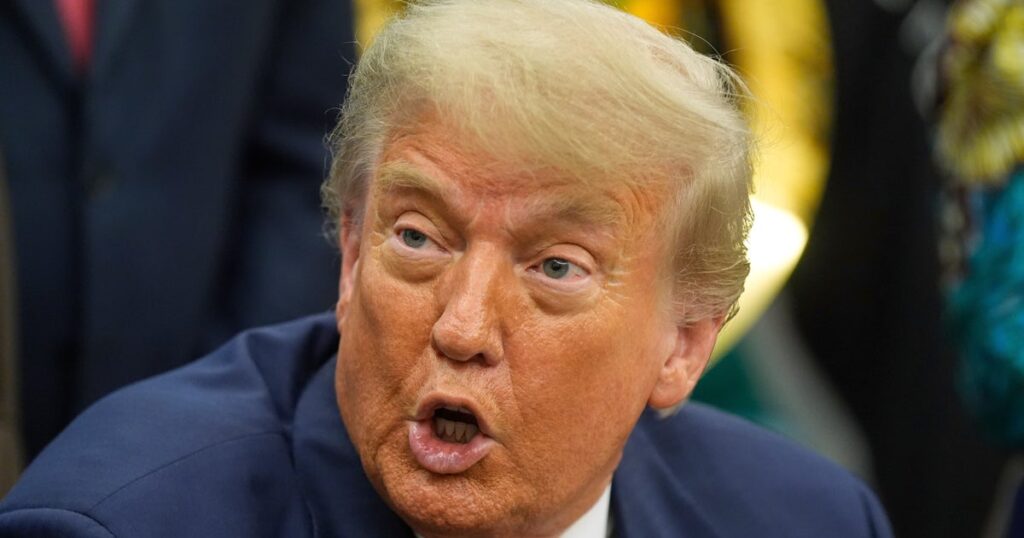
In a recent interview with Fox News host Maria Bartiromo, former President Donald Trump made a series of comments about Japan that have left critics and observers bewildered. During the discussion, Trump suggested imposing new tariffs on Japanese automobiles but stumbled over the name of Japan’s leader, referring to him instead as “Mr. Japan.”
Trump explained that he planned to send letters to various countries as the pause on tariffs concludes early next month, using Japan as a specific example. “Dear Mr. Japan: Here’s the story,” Trump said. “You’re going to pay a 25% tariff on your cars.” His comments were intended to address what he perceives as an imbalance in the automotive trade between the United States and Japan, claiming that the U.S. imports “millions and millions” of Japanese cars while Japan imports few American vehicles.
Background on U.S.-Japan Trade Relations
The former president’s comments come amidst a long-standing debate over trade imbalances between the United States and Japan. Historically, the U.S. has expressed concerns over the number of Japanese cars entering the American market compared to the number of American cars sold in Japan. However, it’s important to note that a significant portion of Japanese cars sold in the U.S. are manufactured domestically, reducing the potential impact of any new tariffs.
Trump’s approach to tariffs has been consistent with his broader economic strategy, which emphasizes encouraging foreign companies to increase production within the United States. “My message to every business in the world is very simple: Come make your product in America, and we will give you among the lowest taxes of any nation on Earth,” Trump stated in January.
Reactions and Criticism
The phrase “Dear Mr. Japan” quickly became a focal point for criticism, with many taking to social media to express their disbelief and ridicule. Former Republican Congresswoman Barbara Comstock tweeted, “Dear Mr Japan? Trump doesn’t know what or who he is talking about.” Others, like political commentator Michael Hausam, pointed out factual inaccuracies in Trump’s statements about the automotive trade.
Fact: Japan manufactures more cars in the US than it imports to the US. Japan has some $700 billion invested in the US, employing close to 1 million Americans.
Critics argue that such comments from a former president could undermine diplomatic relations and reflect a lack of understanding of international trade dynamics. The gaffe has been compared to hypothetical scenarios involving other political figures, with many suggesting that similar missteps by current leaders would lead to widespread calls for accountability.
Implications for Future Trade Policies
The controversy over Trump’s comments raises questions about the future of U.S.-Japan trade relations and the potential impact of new tariffs. While the former president’s rhetoric aims to bolster American manufacturing, experts warn that imposing additional tariffs could strain relations with key allies and disrupt existing economic partnerships.
According to trade analysts, the automotive industry is particularly sensitive to changes in tariff policies, given its global supply chains and the interdependence of international markets. Any significant shifts could lead to increased costs for consumers and retaliatory measures from affected countries.
“Trade policies must be carefully crafted to balance domestic economic interests with international cooperation,” said Dr. Emily Chen, a professor of international trade at Georgetown University. “Missteps in diplomacy can have far-reaching consequences.”
Looking Ahead
As the debate over tariffs and trade continues, stakeholders from various sectors are closely monitoring developments. The potential for new tariffs on Japanese cars remains a contentious issue, with implications for both the U.S. economy and its diplomatic relations.
While Trump’s comments have sparked a wave of criticism, they also highlight the complexities of international trade and the challenges of navigating geopolitical relationships in an increasingly interconnected world. As policymakers consider the next steps, the focus will likely remain on finding a balance that supports domestic industries while maintaining strong international alliances.






